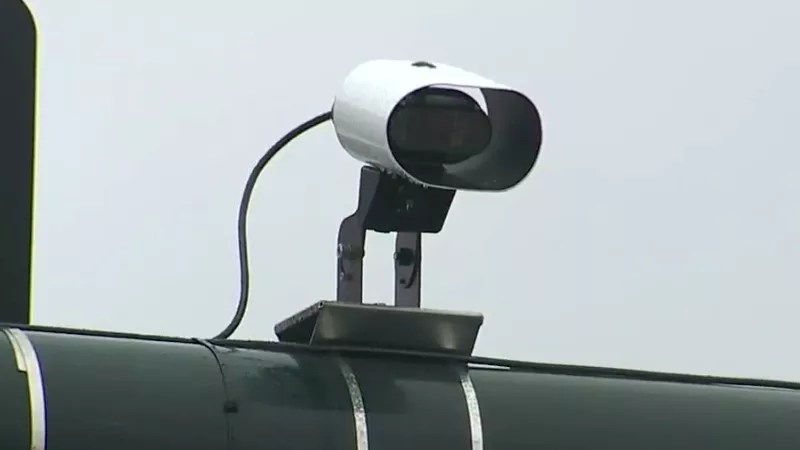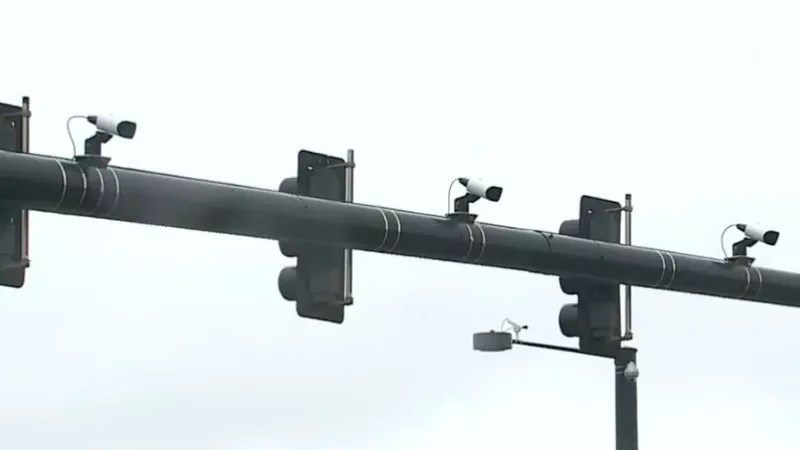
Courtesy of Denver7

Audio By Carbonatix
The Denver Police Department’s installation of license plate readers capable of scanning the plate of every vehicle that passes through the busy intersection at Federal Boulevard and Sixth Avenue raises concerns for the ACLU of Colorado on a number of fronts, including the possibility of the resulting data being mined in ways that threaten the privacy of motorists who haven’t committed a crime.
“To be blunt, we hate them,” Denise Maes, the local ACLU branch’s public policy director, says of the devices, which are shorthanded as LPRs.
DPD Division Chief of Patrol Ron Thomas counters that the department is going to be very selective in the way it uses information gathered by the readers. But he acknowledges that while data mining won’t be routinely conducted, it could happen on occasion if approved at what he refers to as “the command level.”
Although the Federal and Sixth LPRs aren’t operational yet, Thomas says they could be switched on within days if they pass tests that are ongoing at this writing. They’re the first permanent license plate readers in Denver, having been purchased at the cost of $62,000 under the DPD’s 2018 budget.
However, Thomas points out that “we’ve been using LPRs attached to our patrol vehicles – we have eleven of them – since 2015, and officers are trained in their use. They use them when they’re on the patrol, and after they read the license plates, they transmit information about wanted parties and wanted vehicles to their cars. They’re alerted to that so that they can take action on those kinds of things.”

The Sixth and Federal intersection.
Courtesy of Denver7
The folks at the ACLU have never been fans of the portable readers, Maes points out. But she sees the new gadgets as especially problematic because “they’re permanent. They don’t move around the city like the others did. And the location of Sixth and Federal is in an area that’s a majority location of color. I worry we’re over-policing that part of Denver as it is, and this will only add to it. I find that very disconcerting.”
Maes adds that data is being collected from drivers “without any evidence that any wrong has been conducted in that place. And what are they doing with that data? How is it being used? How is it being mined? They’re tracking everyone who goes through that intersection, which means they’re collecting data on tens of thousands of Denver residents. What are they doing with that information? And where is the transparency and accountability of Denver even doing this? There are no checks and balances. The Denver Police Department buys a new toy and puts it at a certain intersection, and we have no understanding about why there and why now.”
Thomas tackles these issues one by one. He emphasizes that “we didn’t consider race or socio-economics at all” in choosing the Federal and Sixth setting. “We’re a very data-driven department, and we looked at data over the course of several years to identify that location, which is very near the location of quite a few fatal hit-and-run accidents, as well as a place where we’ve seen a lot of stolen vehicles and other major crimes. We thought, if we only have one of these pieces of technology and can only put it in one place, that would be the most proven place to put it.”
He also maintains that “we’re not doing any data-mining. We’re only taking action on active reads – the information on those license plates that are associated with Amber Alerts, Medina Alerts, people wanted for violent crimes. That information is going to be pushed to officers’ computers so they can search for those vehicles. But we’re not mining this data looking for whatever we can find.”

Another angle on the Sixth and Federal license plate readers.
Courtesy of Denver7
According to Thomas, the information recorded by LPRs “can be stored by law for three years, but we’re only storing it for 720 days, which is about two years. That’s an extra step we’ve taken at the Denver Police Department. And we would have to have a true law enforcement need to look at that data after the fact.”
When asked for an example, Thomas says, “There’s the potential that if there was a violent crime that happened near the intersection, we might look at the stored data to see if a suspect has been identified and passed through that intersection within a time frame consistent with the time of the crime. But it would be up to the district commander or the major-crimes commander to determine whether or not that would be a sufficient enough reason to use it. Officers are not going to have the capacity or ability to just start mining data on their own.”
In his view, license plate readers are “just a safety tool – a tool that we’re employing, like many other tools we have to promote safety in our city. And we’ll monitor the success of the unit at Sixth and Federal to see if there’s value in expanding that technology, maybe with future budget requests in the years to come.”
This prospect hardly cheers the ACLU’s Maes. She troubled by the proliferation of license plate readers and gear like HALO cameras (there are at least 226 of them in Denver right now), seeing the resulting loss of privacy as “death by a thousand cuts. And just because there are already many ways to intrude and interfere with our privacy doesn’t mean we should allow more of it to happen. In fact, we should disallow more. The technology to invade our privacy is moving at a far greater rate than the law is to protect us, and policymakers need to watch it and put an end to it.”
All of this tech “has the potential to invade one’s privacy,” she argues. “And the more we allow that to occur, the less privacy we will have.”